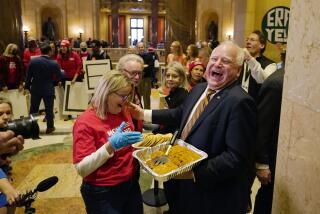Sen. Harkin Banking on Populist Appeal : Democrats: He invokes traditional party ideals as he girds to bid for presidential nomination.
ST. PAUL, Minn. — A year ago, Iowa’s Tom Harkin, because of his liberal record, was high on the list of endangered Democratic Senate incumbents. But he jolted the experts last November by becoming the first Democratic senator to win reelection in the history of his state.
Emboldened by success, and as liberal as ever, Harkin is now girding to seek his party’s presidential nomination, following a course that some say spells political suicide. He is defying the conventional wisdom that for the Democrats to win back the White House they must, as Harkin puts it, “walk a little bit more and talk a little bit more like Republicans.”
In nearly every one of the feisty populist orations that have become the trademark of his candidacy, Harkin rejects any thought of such a partisan transformation. At an “ice cream and hot politics” rally here this month where exuberant party activists chanted, “Run, Tom, run!” Harkin declared: “Harry Truman always said that if you run a Republican against a Republican, you can bet your bottom dollar that a Republican will win every time.”
Harkin’s own formula for Democratic success is to return to the party’s ideological roots.
“What made this country great are the values of the Democratic Party, the values that my parents gave to me and your parents gave to you,” the sinewy, 51-year-old senator contended at a get-acquainted reception with party leaders in neighboring Minneapolis. As examples, he cited such Middle American icons as “economic opportunity, hard work, individual responsibility, having faith in God, having care and concern for those less fortunate than ourselves.”
This approach has served him well enough during the past three months of testing the water that a formal declaration of candidacy is considered all but certain. It probably will occur on Sept. 15.
Given his message and the ideological cast of the probable Democratic field, Harkin’s candidacy would have a considerable advantage. So far, former Massachusetts Sen. Paul E. Tsongas is the only declared candidate, while Arkansas Gov. Bill Clinton, Tennessee Sen. Albert Gore Jr., Virginia Gov. L. Douglas Wilder and former California Gov. Edmund G. Brown Jr. are considering the race.
Unless New York Gov. Mario M. Cuomo or the Rev. Jesse Jackson enters the competition, Harkin seems likely to have a better chance than any of his rivals to gain the allegiance of the liberal cadre, a force that, when it is united, can come close to dominating the Democratic Party nominating process.
But some Democrats fear that by telling union leaders and other party liberals what they want to hear, Harkin may be positioning himself too far to the left to win back the mainstream voters Democrats need to regain the White House.
But Harkin’s message inverts the standard terms that are applied to Democrats and Republicans, liberals and conservatives, in political lexicographies. Democrats created “a ladder of success” to open the way to economic opportunity, he told the party leaders in Minneapolis. By contrast, Harkin claimed, the Republicans “put out a safety net,” a term he derided. “That safety net has turned into you know what, a basket. We have a basket case of people in this country at the bottom with no hope and no ladder.”
For his candidacy, Harkin tells his audiences, the main target will not be Republican voters but Democratic non-voters.
“I tell you one thing,” he says. “I am not going to fight George Bush for his votes. George Bush got 26% of the total eligible vote. And I got to fight him for that?”
Instead, Harkin intends to focus on “the ordinary hard-working Americans out there who basically said in 1988 that if that guy (Michael S.) Dukakis doesn’t believe in what he believes in enough to fight back, what the heck, we’ll stay home.”
Harkin promises he won’t be as passive as Dukakis was in the face of Bush’s attacks.
As a case in point, he described how he would respond to expected Republican criticism of his vote last January to continue economic sanctions rather than to use force against Saddam Hussein’s legions in Kuwait, an issue that some Democrats fear would seriously hurt his chances against Bush.
But that is not the way Harkin sees it. “First, I won’t accept their definition of beginning the debate on Jan. 15,” Harkin said. “I want to talk about why George Bush coddled Saddam Hussein for years before that. Bush has got to answer for that.”
Second, Harkin said he will take after Bush for “being too quick to get in and to quick to get out” of the war. “We should have gone in there and got the job done. We didn’t do it. Now, we’re playing catch-up ball again.”
To help silence any questions about his patriotism, Harkin supporters say the senator can cite his service from 1962 to 1967 as a Navy jet pilot. “He won’t be viewed as a radical or a flake,” said Minnesota Democratic Chairman Todd Otis. “He’ll be viewed as a common-sense Democrat.” Otis added approvingly: “He has guts and he will stand toe-to-toe with Bush.”
At this stage in his candidacy, Harkin sets forth his goals for the future in broad strokes rather than in detailed policy blueprints.
Asked at the Minneapolis reception how he would avoid giving middle-class voters the impression he is just another “tax-and-spend” liberal, he said: “I’ll tell them I may not decrease your taxes, but I won’t increase them. And I’ll make damn sure of one thing--you’re going to see something coming back.
“We’re going to start putting people to work. You’re going to see more mass transit, better roads, better water systems and you’re going to see new energy systems.”
As another way to fund domestic programs, Harkin would transfer American troops out of Europe, where he claims they are now pouring $50 billion a year into the German economy, and assign them to a rapid deployment force stationed at home.
But more important than specifics, Harkin contends, is building a bond of trust with voters. “If you believe strongly in something and you share fundamental values with the voters, they will give you a lot of running room. They don’t want to know how you are going to dot every I and cross every T, as long as they feel you believe in something.”
Though Harkin clearly enjoys the unaccustomed national attention he has received during his recent journeys and has exhibited boundless energy as a campaigner, his patience has its limits.
Pressed by a gay-rights activist at a state party executive committee meeting here because he would not agree to co-sponsor an anti-discrimination measure for gays, though he was willing to vote for the bill, Harkin snapped: “That’s not the way I’m going to run my campaign. If you won’t support me just because I won’t put my name on a bill that doesn’t have a snowball’s chance in hell of passing, so be it.”
Otis said later: “Some people thought he reacted too heavily.” On the other hand, given the standard indictment of the Democrats as a party too willing to make concessions to special interest groups, Harkin’s show of temper might be taken as a welcome sign of mental toughness and political independence.
Profile: Tom Harkin Born: November 19, 1939
Hometown: Cumming, Iowa
Education: BS, Iowa State University, 1962; law degree, Catholic University of America Law School, 1972
Career highlights: U.S. Navy pilot, 1962-67. Elected to House of Representatives in 1974, where he worked for passage of measures to make U.S. foreign aid contingent on human rights progress. Elected to U.S. Senate in 1984, sponsored Harkin-Gephardt bill to let farmers vote on whether to institute production controls on crops. Chief architect of Americans with Disabilities Act barring discrimination against disabled citizens. His victory in 1990 election made him the first Democratic senator in Iowa’s history to be returned to office.
Hobbies: Flying, tinkering with old cars. Co-author with C.E. Thomas of “Five Minutes to Midnight: Why the Nuclear Threat is Growing Faster than Ever.”
Personal: Married to Ruth Raduenze Harkin, attorney. Two daughters, Amy, 15, and Jenny, 10.
More to Read
Get the L.A. Times Politics newsletter
Deeply reported insights into legislation, politics and policy from Sacramento, Washington and beyond. In your inbox three times per week.
You may occasionally receive promotional content from the Los Angeles Times.










